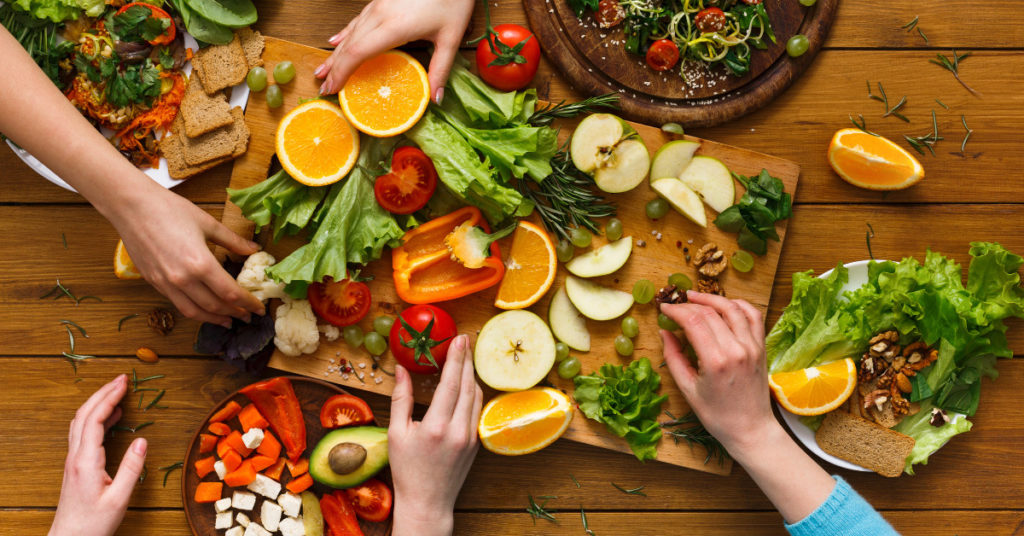
Most of us think of Qi Gong as a movement and meditation practice that happens in a classroom or at home. Indeed, Qi Gong is a practice that includes routines and meditations. However, it is also much more than that.
If we recall some of Lee’s lessons, we’re reminded that “Qi” refers to our internal life force energy, and “Gong” is the skill of working with that energy. The movement and meditation practices that Lee teaches are a wonderful way to work with our Qi. However, another important way in which we work with our Qi is through our actions and behaviors. Everything we do influences our Qi in one way or another, so it’s important to be aware of how our decisions are affecting our inner world.
One of the most important ways in which we work with our Qi is through our eating and nutrition. Food delivers essential energy to the elemental energies within us, and the way in which we eat makes a big difference. This blog post will share insight about how to make decisions surrounding your diet and nutrition, as well as how to eat in a way that supports balance and mindfulness.
Diet is Based on the Individual
How do you view food and eating? Although we all need food to survive, there are many different ways in which we can relate to the process of eating. Some see it simply as a means for survival, others as a way to connect with loved ones, and sometimes it can be used as an emotional crutch.
In Chinese Medicine, we seek to realize that food is an essential energy and medicine for your body. The food we eat becomes part of who we are, just as the words we hear or the sights we see. Just as it’s important to limit the harmful words we listen to, we all need to choose the foods that are good medicine for who we are.
How do you know what foods are best for who you are? Well, it just so happens that there’s no “best diet” for every single person, just a “best diet” for you as an individual. Therefore, we all have our own path for understanding what foods are best for ourselves.
Fortunately, your body contains great wisdom about what is good for it. Listen to your body and it will help to guide you in understanding what foods are healthy and which should be avoided. This requires paying close attention and being honest with yourself about how you truly feel after eating. If you really sit with yourself and check in with your body at the end of a meal, chances are you’ll be able to tell if you feel well nourished or if something feels slightly off.
Sometimes it’s really obvious that what you ate isn’t sitting well. Stomach pain, nausea, or fatigue are clear signs that what you ate isn’t serving you. However, not all negative energy is so clear. Even if you don’t feel noticeable pain or discomfort after a meal, sit with yourself and feel your energy and body on a deeper level.
Over time, you’ll begin to notice the differences between various types of foods and what kind of meals serve you best. Just as Qi Gong is based on what we call “subtle energy,” so is the practice of eating nourishing food. It’s easy to overlook the presence of Qi when you’re cruising through life focussed on other things. But, just as you’re able to slow down and feel the awakening of Qi in one of Lee’s classes, you’ll also be able to attune your awareness to your experience of eating when you bring your attention to how you feel after each meal.
Food, Elements and Seasons
What determines our dietary needs? A big part of it is simply based on your individual composition. In Chinese Medicine, we learn that all people are comprised of the elemental energies of metal, water, wood, fire, and earth. Although we’re all part of nature and contain the same “building blocks,” each of us contains different amounts of each element. Science tells us that we each have our own unique code of DNA that determines our biology. The Chinese Medicine understanding of the elements is no different.
Each of us requires different foods and in different proportions based on the relative strength of each element within us. This is because each food and taste affects our elemental energies in different ways. For example, the fire element reflects spicy and warming foods while the water element reflects salty and cooling foods. The wood element is sour and warming and metal is pungent and mildly cooling. The earth element is neutral in temperature and tastes sweet.
Based on this understanding, those who are deficient in their fire element may benefit from spicy and warm foods, while those who want to give their metal element a boost may choose to eat pungent and mildly cooling foods. Although having an intellectual understanding of this framework can be helpful, it’s also important to really check in with your body and let your experiences guide your choices.
Another important aspect of our dietary needs are the seasons. Just as the seasons affect the world around us, they also affect who we are as humans and what our needs are.
At Holden QiGong, we always offer workshops to help us learn the Qi Gong practices that help to welcome the gifts of the season. Similarly, we can look inside ourselves to understand what foods will serve us best during each season of the year.
One clear example that many can relate to is the desire for hot or warm foods during the winter months. Our body naturally seeks balance, and when the weather is cold or harsh, we know that hot foods will help us maintain our internal equilibrium.
How You Eat Is Also Important
One thing that many people don’t realize about their eating habits is that you don’t just digest food, you also digest emotions. Therefore, it’s very important to eat in such a way that you’re ingesting both nourishing food and nourishing emotions.
How do you seek to digest nourishing emotions? Well, many of us find ourselves rushing to eat during a busy day, or even choosing to eat when our emotions are unsettled. We wouldn’t try to have an important, emotional conversation with a loved one when we’re stressed out and only have five-minutes to spare, and neither should we try to eat in such circumstances either. Instead, we can seek to view our mealtime as a sacred space for nourishment of mental, emotional, and spiritual health.
To do this, try to slow down and eat with mindfulness. The Taoist recommendation is to chew food fifty times for each bite. This may be a bit much for most people, so Lee recommends chewing the first bite of your meal twenty-five times to establish a pattern for yourself. Digestion starts in your mouth, not your stomach, so give yourself the time to really absorb all of the nutrients and joy that your food has to offer.
Another general tip is to not drink cold liquids during a meal as they can tend to put out your digestive fires. Instead, seek to drink warm liquids that help to stimulate digestion and help you get the most out of your meal. By truly checking in with yourself about your own needs and eating in a mindful manner, you can enjoy the process of cultivating your Qi in every meal throughout your day.
Understanding Yourself with The Five Elements
At Holden QiGong, one of our primary goals is to provide resources and opportunities for individuals to empower themselves. One of these opportunities is Lee’s Five Elements workshop series. Together, these workshops help students better understand their own unique gifts and individuality.
By realizing what elements are most alive and which are more discrete within us, we can understand what choices will help us to find balance and harmony. Through this process, students can gain more insight into their emotions, personality, dietary needs, and more.
These workshops are also is an amazing way to learn the Five Elements wisdom and practices for greater health and enhanced vitality.
Five Elements Workshop Series
The link below contains a lot of great information about the Five Elements workshop series and how it can enrich your Qi Gong journey. The gifts of nature live within each of us and are waiting to be cultivated, so click the link below to learn more and start practicing today.
